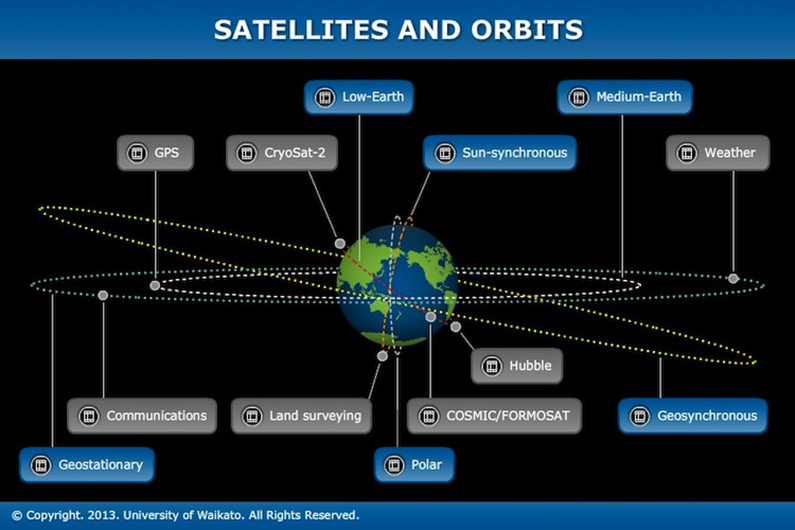Article: Gravity & Satellites
- Due Jan 25, 2018 at 11:59pm
- Points 100
- Questions 3
- Available Oct 30, 2017 at 7:30am - Jan 29, 2018 at 11:59pm
- Time Limit None
- Allowed Attempts Unlimited
Instructions
Gravity & Satellites

You may have heard the story of how Isaac Newton discovered gravity. As the legend
goes, Newton was sitting under an apple tree when, all of a sudden, an apple dropped from the tree and fell on his head. This incident made him wonder why the apple fell toward the ground and not in any other direction.
Nowadays, it seems quite silly to think that an apple might fall up, or sideways. That’s
because now we know that Earth’s gravity makes everything fall down, toward the planet’s center. Gravity is the reason we are able to stand on the earth. Without it, we would all float off into space!
 Gravity is also necessary for the operation of satellites. Usually when people talk about
Gravity is also necessary for the operation of satellites. Usually when people talk about
satellites, they are referring to manmade objects that have been sent into orbit. However, the moon is also a satellite! A satellite is any object that revolves around a planet in a circular or elliptical path. The path of a satellite is its orbit.
Manmade satellites have all kinds of important applications. Communications satellites,
for instance, are satellites that are sent to orbit the earth for the purpose of sending
communication signals or messages. Though we might not think about it when we’re on the phone, using the Internet, watching television, or listening to the radio, many satellites help make those activities possible for us to enjoy.
Scientists have used observation satellites. These are satellites that have been
specifically designed to monitor the earth. Observation satellites are used to keep track of the weather, detect changes in the environment, and create maps of the earth. They can be very useful for scientists in monitoring natural disasters, global warming, pollution, and other changes to the planet. The military also has spy satellites (very similar to observation satellites) that help them to peek in on other people around the world.
If you’re ever in the car and need to find directions to go somewhere, you have probably
used the Global Positioning System, also known as GPS. This is a network of 24 satellites that people with a GPS receiver can use to determine their location.
These are the main applications of satellites you may have encountered in your everyday
life, but of course there are countless others! Satellites are incredibly useful, but how exactly do they stay in orbit?
It might seem strange that gravity doesn’t cause satellites to just fall straight down to
Earth, like Newton’s apple. Why is that? It turns out that the earth’s gravitational pull on an object weakens the farther away it is from the planet’s surface. Satellites orbit far above the earth’s surface at a set speed. Earth has an “escape velocity,” which is the minimum speed necessary for an object to escape the earth’s gravity entirely and fly off into outer space.
Earth’s escape velocity is more than 25,000 miles per hour. Engineers don’t build satellites that travel faster than that because they don’t want their satellites flying off into space.
Satellites are designed to achieve a balance. They revolve around the earth slowly
enough to avoid drifting off into space, but fast enough to avoid getting pulled completely
down toward the center of the earth by the force of gravity. At the correct velocity, a satellite is pulled by the earth with just enough force to maintain its orbit. The closer a satellite is to the
earth’s surface, the faster it needs to go in order to stay in orbit. And satellites have a circular or elliptical orbit because they are constantly being pulled toward the earth’s surface, which is curved.
Therefore, gravity is an important part of our daily lives, whether it’s keeping our feet
firmly planted on the planet’s surface, or keeping our satellites in orbit to help us communicate
with one another and learn more about the world we live in.
